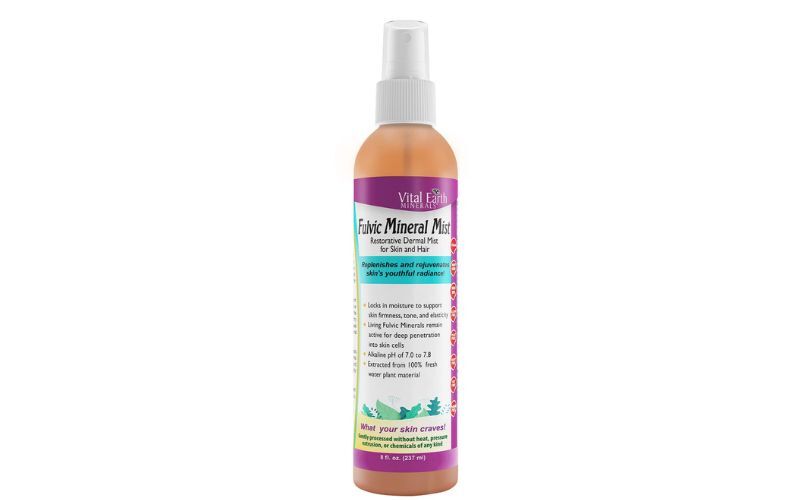Vitamins for Anti-Aging: Radiant & Healthy Skin Guide
11th Feb 2025
When it comes to skincare, most people think of topical creams, facials, and treatments. But the truth is, achieving glowing skin begins from within. Diet plays a crucial role in maintaining your skin's health and radiance. One of the best ways to nourish your skin is through essential vitamins that support its natural glow and combat signs of aging, dryness, and dullness.
In this blog, we’ll explore the top vitamins for glowing skin, their benefits, and how to incorporate them into your routine for smoother, healthier, and more radiant skin.
Experience the revitalizing power of nature with Vital Earth Fulvic Mineral Mist – enhance your skin's glow and hydration today!
Why Are Vitamins Important For Skin Health?
Vitamins are important for your overall health, including your skin. They help combat environmental stressors, protect against free radical damage, boost collagen production, and support hydration and elasticity. Many skin issues, such as acne, dark spots, and premature aging, can arise due to a lack of certain vitamins in your diet. Ensuring you’re getting the right nutrients can help restore your skin’s natural beauty and make it glow from the inside out.
6 Best Vitamins To Prevent Premature Aging
Let’s dive into the most important vitamins for achieving glowing skin.
1. Vitamin C: The Brightening Vitamin
Vitamin C is widely recognized for its skin-brightening and anti-aging properties. As a potent antioxidant, vitamin C plays a crucial role in neutralizing free radicals, contributing to oxidative stress and accelerating the aging process. By combating these free radicals, vitamin C not only safeguards the skin but also stimulates collagen production, an essential component for preserving skin elasticity and minimizing the visibility of fine lines and wrinkles.
Benefits of Vitamin C for Skin
-
Brightens skin tone and reduces hyperpigmentation.
-
Stimulates collagen production for smoother, firmer skin
-
Fights free radicals and protects against environmental damage
-
It helps reduce dark spots and uneven skin tone
How to Use Vitamin C for Glowing Skin
You can incorporate liquid vitamin C into your skincare routine through serums, creams, or foods rich in this vitamin. Oranges, strawberries, bell peppers, and broccoli are excellent sources of vitamin C. Topical serums with stabilized vitamin C are also highly effective for delivering this vitamin directly to your skin.
2. Vitamin E: The Ultimate Skin Protector
Vitamin E is another powerful antioxidant that works in harmony with vitamin C to protect your skin from free radical damage caused by environmental pollutants, UV rays, and stress. It is known for nourishing and hydrating the skin, making it look plumper and more youthful. Vitamin E also has soothing properties, helping to calm irritated or puffy skin.
Benefits of Vitamin E for Skin
-
Helps protect skin from harmful UV rays and environmental damage
-
Deeply moisturizes and nourishes the skin
-
Reduces the appearance of scars and dark spots, which makes it vest vitamin for women
-
Soothing irritated and swollen skin
How to Use Vitamin E for Glowing Skin
You can apply vitamin E directly to the skin via oils or lotions or ingest it through nuts, seeds, and vegetable oils. For topical use, vitamin E oil can be massaged gently into the skin or added to your regular moisturizer for an added boost of hydration.
3. Vitamin A: The Anti-Aging Vitamin
Vitamin A is essential for cell turnover and is key to maintaining healthy skin. This vitamin promotes the production of new skin cells and helps prevent the accumulation of dead skin cells, leading to dull, rough skin. By boosting the skin’s natural regeneration process, vitamin A can help reduce fine lines, wrinkles, and age spots, making it a must-have for anti-aging skincare.
Benefits of Vitamin A for Skin
-
Promotes cell turnover and prevents clogged pores
-
Reduces the appearance of fine lines, wrinkles, and age spots
-
Improves skin texture and smoothness
-
Helps prevent acne breakouts
How to Use Vitamin A for Glowing Skin
Vitamin A is available in both topical forms (like retinol and retinoids) and through dietary sources. Retinoid creams and serums are popular options for targeting aging skin concerns. If you're looking for natural sources, foods like sweet potatoes, carrots, spinach, and liver are rich in vitamin A.
4. Vitamin D: The Skin Healer
Vitamin D, also known as the sunshine vitamin, plays a vital role in skin health. This essential nutrient is crucial for the skin's repair processes and helps reduce irritation. A vitamin D deficiency can lead to various skin issues, including acne, eczema, and psoriasis. Ensuring your body gets adequate vitamin D can promote faster skin healing and combat dry, irritated skin.
Benefits of Vitamin D for Skin
-
Enhances skin healing and repair
-
Reduces puffiness and redness
-
Prevents dry skin and conditions like eczema and psoriasis
-
Supports healthy immune function to protect against infections
How to Use Vitamin D for Glowing Skin
The best way to obtain vitamin D is to expose your skin to sunlight, which helps your body synthesize the vitamin naturally. You can consume foods like fatty fish, eggs, and fortified dairy products if you have limited sun exposure. In some cases, vitamin D supplements may be necessary, especially for those with low levels of this vitamin.
5. Vitamin B3 (Niacinamide): The Skin Balancer
Vitamin B3, also called niacinamide, is a versatile vitamin with multiple benefits for skin glow. It strengthens the skin's natural barrier and helps make it more resilient to environmental stress. Niacinamide regulates oil production and helps people with oily or acne-prone skin. It can reduce the size of pores and help create an even tone and texture of the skin.
Benefits of Vitamin B3 for Skin
-
Improves skin’s texture and smoothness
-
Reduces the appearance of pores and fine lines
-
Evens out skin tone and reduces redness
-
Regulates oil production and prevents acne
How to Use Vitamin B3 for Healthy Glowing Skin
Niacinamide is added to skincare serums, moisturizers, and face masks. Many oil-control or anti-acne creams contain niacinamide as their active ingredient. For those looking at food sources of niacinamide, this vitamin can be obtained from poultry, fish, and whole grains.
6. Vitamin K: The Repairing Vitamin
Vitamin K is often overlooked but is critical in skin repair and rejuvenation. This vitamin helps to reduce dark circles under the eyes and promotes healing after skin injuries or bruises. It also aids in regulating blood clotting, which contributes to a healthier complexion and promotes healing from skin irritations and redness.
Benefits of Vitamin K for Skin
-
Reduces the appearance of dark circles and bruises
-
It accelerates faster healing of the skin as well as recovering it
-
Remedies help decrease redness and irritation
Using Vitamin K to Have Glowing Skin
The most common natural source of Vitamin K is green leafy veggies, including broccoli, kale, and spinach. Topical creams containing Vitamin K can also be applied to specific areas in the body requiring healing, including eye bags or a procedure after facing them.
Verdict
Glowing skin does not come from a one-time application. Feed your skin with essential vitamins, improve its radiance, and fight the common causes of dullness and aging. Consistency is the key: incorporate these vitamins into your daily skincare and diet to achieve long-term benefits.
Frequently Asked Questions
How can I get enough Vitamin C for my skin?
Citrus fruits such as oranges, strawberries, and kiwi are good to eat to elevate vitamin C consumption. You may also apply a serum that carries vitamin C onto your skin to apply the brightening and anti-aging effects.
Is Vitamin E good for acne-prone skin?
Yes, vitamin E can help soothe and heal irritated skin. However, if you have oily or acne-prone skin, it's best to use vitamin E in moderation and choose non-comedogenic products to avoid clogging pores.
Can I take vitamin supplements for glowing skin?
While vitamin supplements can help address deficiencies, it's always best to prioritize a well-balanced diet that includes foods rich in essential vitamins. If you’re considering supplements, consult a healthcare provider to ensure they’re right.






